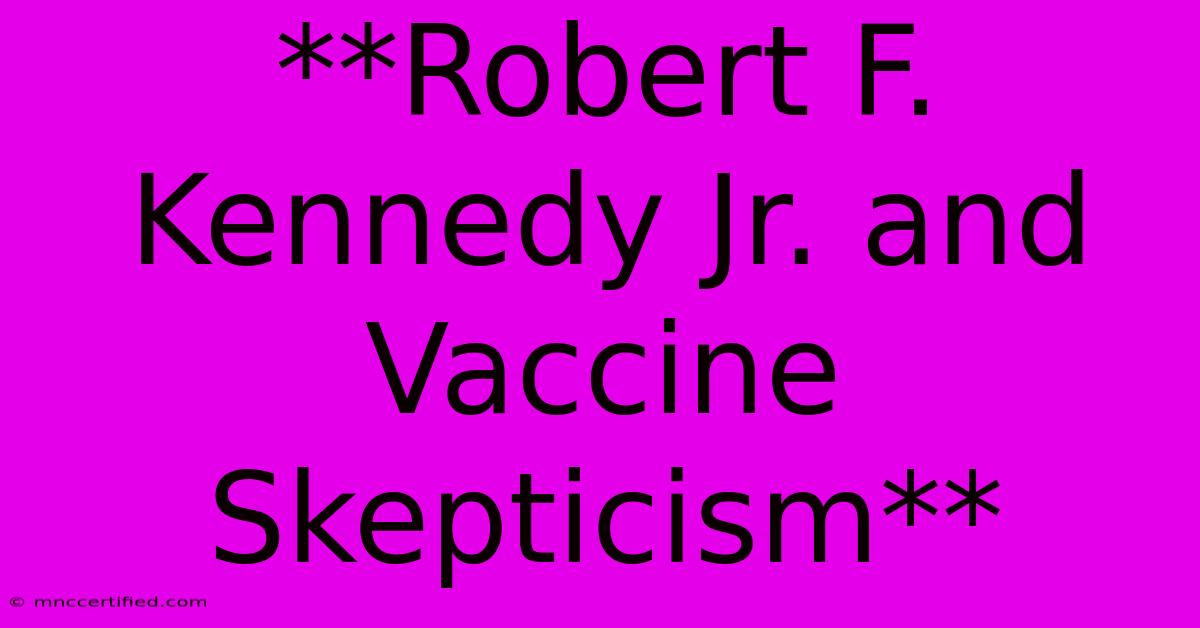**Robert F. Kennedy Jr. And Vaccine Skepticism**

Table of Contents
Robert F. Kennedy Jr. and the Rise of Vaccine Skepticism: A Complex Legacy
Robert F. Kennedy Jr., a renowned environmental lawyer and the nephew of former President John F. Kennedy, has emerged as a prominent voice in the anti-vaccine movement. While he is recognized for his environmental activism, his stance on vaccines has sparked intense debate and controversy. This article delves into the complex legacy of Robert F. Kennedy Jr., exploring his arguments, the impact of his views, and the crucial role of evidence-based decision-making in public health.
From Environmental Activism to Vaccine Skepticism
Kennedy's initial foray into the public eye was marked by his dedication to environmental causes. He founded the environmental group Waterkeeper Alliance and spearheaded legal campaigns against polluters, advocating for clean water and healthy ecosystems. His work in this domain earned him widespread acclaim and cemented his image as a champion of environmental justice.
However, in recent years, Kennedy's focus shifted towards vaccine skepticism. He has been vocal in questioning the safety and efficacy of vaccines, drawing connections between vaccination and various health conditions. His claims, often publicized through books, articles, and public appearances, have gained significant traction among those hesitant about vaccination.
The Core of Kennedy's Arguments
Kennedy's arguments against vaccines primarily revolve around three key claims:
- Mercury in Vaccines: He points to the use of thimerosal, a mercury-containing preservative, in some vaccines, alleging a link to autism and other developmental disorders. However, numerous scientific studies have refuted this claim, demonstrating that thimerosal does not cause autism and that vaccines are safe for children.
- Vaccine Overload: Kennedy argues that the sheer number of vaccines given to children overwhelms their immune system, leading to various health problems. This assertion lacks scientific support. The human immune system is designed to handle multiple challenges simultaneously, and the benefits of vaccines far outweigh any theoretical risks.
- Lack of Transparency: He criticizes the pharmaceutical industry and governmental agencies for a lack of transparency regarding vaccine safety and efficacy. While transparency is essential, the scientific process relies on rigorous peer-reviewed studies and robust data analysis.
The Impact of Kennedy's Advocacy
Despite the lack of scientific evidence to support his claims, Kennedy's influence on the anti-vaccine movement is undeniable. His high-profile status, coupled with his charismatic personality and eloquent rhetoric, has resonated with a segment of the population that harbors anxieties about vaccination. This has contributed to a resurgence of vaccine hesitancy and a decline in vaccination rates, raising concerns about public health and disease outbreaks.
The consequences of vaccine hesitancy are severe. Measles, a highly contagious and potentially fatal disease, was declared eradicated in the United States in 2000. However, due to declining vaccination rates, there has been a significant resurgence of measles outbreaks in recent years. These outbreaks highlight the urgent need for evidence-based decision-making and public education regarding vaccines.
The Importance of Evidence-Based Decision-Making
Navigating complex health issues requires a reliance on scientific evidence. The safety and efficacy of vaccines are backed by decades of rigorous research and clinical trials. The World Health Organization (WHO) and the Centers for Disease Control and Prevention (CDC) have consistently affirmed the safety and effectiveness of vaccines, emphasizing their crucial role in protecting individuals and communities from preventable diseases.
It's essential to approach information critically, especially on sensitive topics like vaccines. Scrutinizing sources, evaluating scientific evidence, and consulting with healthcare professionals are crucial steps in making informed decisions about vaccination.
Moving Forward: Bridging the Divide
The debate surrounding vaccines is deeply intertwined with broader societal issues like trust in institutions, misinformation, and the influence of social media. Addressing vaccine hesitancy requires a multi-pronged approach that includes:
- Promoting scientific literacy: Encouraging critical thinking skills and a healthy skepticism towards misinformation.
- Building trust in healthcare professionals: Fostering open dialogue and addressing concerns raised by individuals and communities.
- Addressing vaccine-related anxieties: Offering reliable information and debunking common myths.
- Strengthening public health infrastructure: Ensuring equitable access to vaccines and quality healthcare.
Robert F. Kennedy Jr.'s advocacy has sparked a complex and challenging conversation about vaccines. While his stance has fueled vaccine hesitancy, it has also highlighted the need for a deeper understanding of the science behind vaccination, the importance of evidence-based decision-making, and the crucial role of public health in protecting our communities.

Thank you for visiting our website wich cover about **Robert F. Kennedy Jr. And Vaccine Skepticism**. We hope the information provided has been useful to you. Feel free to contact us if you have any questions or need further assistance. See you next time and dont miss to bookmark.
Featured Posts
-
Erivos Insight Wicked Ballroom Scene Explained
Nov 15, 2024
-
David Coote Video Sparks Controversy
Nov 15, 2024
-
Old Pepper Bourbon Bottled In Bond
Nov 15, 2024
-
Usa Vs Jamaica Nov 14 Match Recap And Analysis
Nov 15, 2024
-
Eva Longoria Exits Dystopian Us With Family
Nov 15, 2024